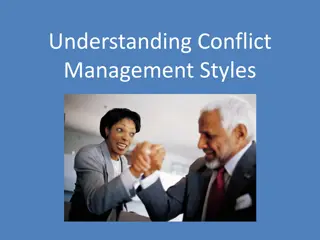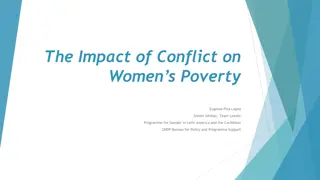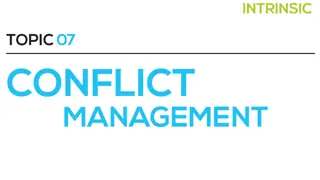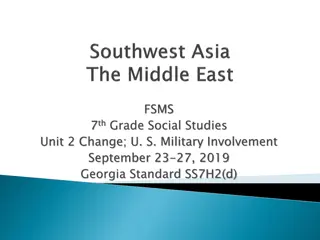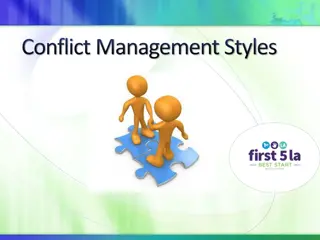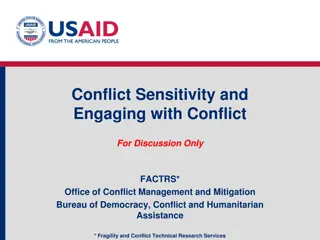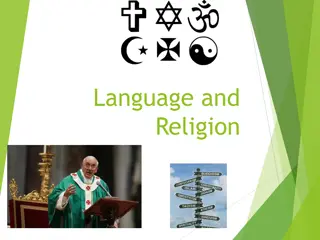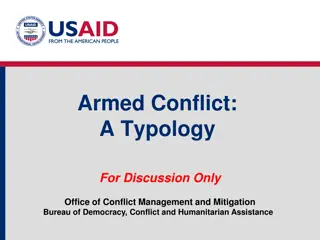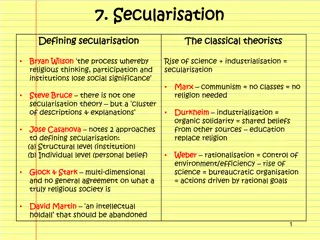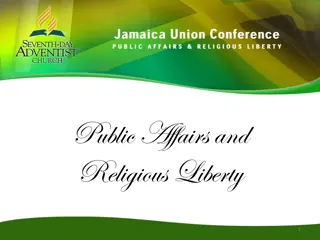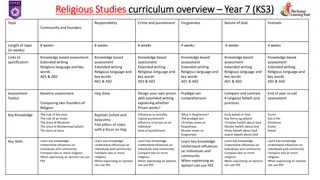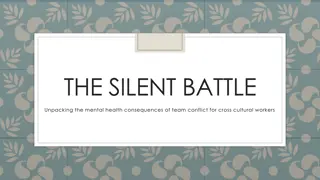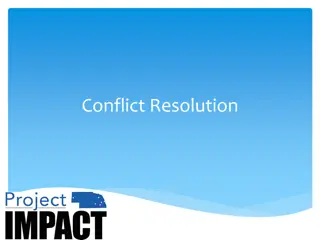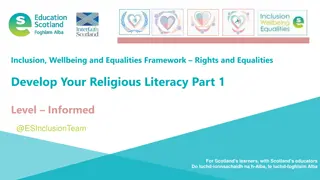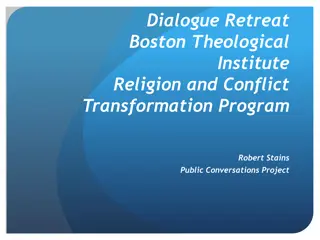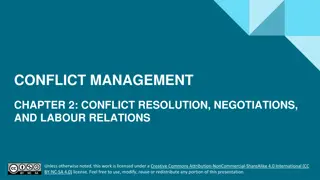Status of Family Laws in India: Hindu vs. Religious Minorities
The family and personal status laws in India vary between Hindu law and those pertaining to religious minorities. While Hindu law has seen extensive reforms, discriminatory provisions still exist. In contrast, laws governing religious minorities have undergone fewer reforms, leading to greater inequ
2 views • 4 slides
Effective Strategies for Managing Interpersonal Conflict at Work
In this seminar led by experts in organizational psychology, attendees learn practical approaches to reduce interpersonal conflict fallout in the workplace. Discussions range from understanding individual and organizational factors influencing conflict to exploring remedies for resolving conflict es
1 views • 21 slides
Understanding Conflict Management Styles in Campus Life
Conflict management styles play a crucial role when resolving issues on campus. Knowing how to handle conflicts effectively is key to managing stress and navigating various situations. This article explores different conflict origins, the positive aspects of conflict, five common conflict management
0 views • 14 slides
Conflict Management Strategies in Organizational Behavior
Explore strategies for managing conflict and negotiation in the workplace, including the importance of conflict resolution and crucial conversations. Learn about the history of negotiating techniques within organizational behavior, the definition of conflict, types of conflict, stages of the conflic
2 views • 36 slides
Understanding Religious Conflict: Definition and Types Explored
Religious conflict is a complex and recurring concept throughout history. Scholars have defined it as disagreements between religious groups. This conflict arises from contentious issues touching on ideology, morality, power, and identity, influenced by various socio-political, economic, and cultura
1 views • 13 slides
Evolution of Akbar's Religious Policy: A Historical Overview
In the 16th century, Akbar the Great implemented a revolutionary religious policy in the Mughal Empire. Initially a devout Sunni Muslim, Akbar evolved his stance to promote harmony and equality among all religions, fostering tolerance and understanding. This shift marked a significant departure from
1 views • 25 slides
Effective Conflict Resolution Strategies for Positive Outcomes
Understand the basics of conflict, learn essential skills for resolution, recognize different conflict management styles, work better in teams, and utilize goal setting to prevent conflicts. Discover the impact of conflicts on relationships and explore unhealthy responses along with healthy conflict
0 views • 30 slides
Elizabethan Religious Settlement: Unity Amidst Division
Amid religious division in England, Queen Elizabeth I implemented a Religious Settlement in 1559 to unify the country. The settlement, a blend of Protestant and Catholic elements, aimed to maintain peace and prevent rebellions. Elizabeth's strategic compromise pleased most people, though lingering t
0 views • 14 slides
Understanding Secularism: Principles and Advantages
Secularism is the principle of separating government institutions from religious entities to ensure equal rights for believers and non-believers. It safeguards freedom of religious belief and practice, upholds religious freedom, and promotes democracy and fairness. Secularism aims to prevent religio
0 views • 21 slides
The Impact of Conflict on Women's Poverty: Insights and Analysis
Poverty and conflict are intertwined in complex ways, where conflict reallocates resources away from development, exacerbating poverty levels. Chronic internal wars can lead to chronic poverty, particularly in states with collapsed governance systems. Addressing the multi-layered dynamics of conflic
0 views • 10 slides
Exploring Conflict Management in Conservation Settings
Delve into conflict management objectives, activities, and understanding the nature of conflict in conservation. Dive deep into types of conflict, factors causing conflicts, and the importance of effective communication. Explore the tools for conflict analysis and reflection to promote resolution an
1 views • 10 slides
Understanding Religious Language: Cognitivism vs. Non-Cognitivism in the University Debate
This discussion explores the debate between cognitivism and non-cognitivism in religious language. Cognitivism asserts that religious claims aim to describe the world and can be true or false, while non-cognitivism argues that such claims express attitudes and cannot be verified. Flew's challenge qu
0 views • 9 slides
U.S. Military Involvement in Southwest Asia: Analyzing Historical Continuity and Change
This unit covers the influence of the U.S. in Southwest Asia and explores events such as the Persian Gulf conflict, invasions of Afghanistan and Iraq. Students will examine the establishment of the modern State of Israel, including historical reasons like Jewish religious ties, the Holocaust, anti-S
5 views • 37 slides
Conflict Management Styles Training and Assessment
Explore different conflict management styles such as SHARK, OWL, FOX, TEDDY BEAR, and TURTLE. Learn the importance of understanding conflict, identifying sources, and managing conflicts effectively. Discover your dominant conflict style through an interactive assessment. Enhance your conflict resolu
0 views • 17 slides
Workplace Skills: Leadership Conflict Mitigation Strategies
Explore the impact of conflict on individuals and groups, learn how conflict can be managed positively, understand conflict mitigation skills, and practice using the Open The Front Door (OTFD) formula for effective conflict resolution in various scenarios.
0 views • 12 slides
Effectiveness of Conflict Resolution Education in Schools
Conflict resolution education plays a crucial role in transforming school environments by reducing violence and promoting win-win outcomes. Various successful programs have shown significant improvements in school settings, such as reduced suspensions and conflicts among students. Conflict resolutio
9 views • 6 slides
Guide to Using the BSA Calendar of Religious Observances
The BSA Calendar of Religious Observances is a valuable resource for scheduling scouting events in consideration of various religious holidays and observances. This guide provides an overview of the calendar, highlights important dates, and emphasizes the importance of respecting religious diversity
0 views • 8 slides
Understanding Conflict Sensitivity Frameworks
Conflict sensitivity frameworks help organizations comprehend and act upon the context of conflict they operate within. By understanding the interaction between their programs and the conflict context, organizations can mitigate negative impacts and enhance positive outcomes. The Conflict Interventi
1 views • 7 slides
Conflict Management Strategies for Effective Team Performance
Explore the importance of conflict management within teams, common conflicts in drug court teams, barriers to healthy conflict management, and strategies to enhance conflict resolution. Understand the misconceptions and truths about conflict, how process conflict impacts group performance, and the b
0 views • 33 slides
Understanding the Role of Language in Religion
Exploring the significance of language in religious contexts, this content discusses the functions, features, lexicon, grammar, and metaphorical aspects present in religious language. It delves into how religious language upholds spiritual beliefs, persuades believers, and expresses specific attitud
0 views • 8 slides
Understanding the Cultural Dimensions of Food and Religious Influences in Culinary Arts
Explore the impact of religious beliefs on food traditions and dietary restrictions across different cultures in the culinary world. Learn about the influence of major world religions on eating habits, food choices, and culinary practices. Discover how various religious groups, such as Christians, o
0 views • 26 slides
Understanding Armed Conflict Typology and Vulnerable Countries
This discussion explores armed conflict typology, including active conflict, post-conflict, and conflict-vulnerable states. It outlines definitions, criteria for categorization, and identifies countries in Africa, Latin America, Asia, and the Middle East currently facing fragility or instability ris
0 views • 10 slides
The Vital Role of Religious Institutions in Supporting Immigrants
Religions and immigration are interlinked in modern societies, where religions play a significant role in providing services, defending rights, and supporting the social cohesion of immigrants. Mainstream religious institutions serve as key actors in offering assistance, advocating for migrant right
2 views • 14 slides
Understanding Religious Language: Flew, Hare, Mitchell
Exploring the contrasting views of cognitivism and non-cognitivism in the context of religious language through the perspectives of Flew, Hare, and Mitchell. Delve into Flew's challenge on the undetectable gardener, Hare's concept of bliks, and Mitchell's response to the rationality of religious bel
0 views • 7 slides
Religious Accommodation in the Army: Advising Command
The content discusses the role of the Chaplain Corps in advising Soldiers and leaders on religious accommodation in the Army as of February 13, 2019. It covers learning objectives, legal foundations, Army policies, procedures, recent changes, and references related to religious accommodation. The in
0 views • 36 slides
Understanding Religious Discrimination Laws in California Workplace
Learn about the regulations and protections under FEHA and Title VII in California, including religious exemptions, accommodation requirements, case studies, and best practices to address discrimination issues effectively. Discover the statistical insights on religious discrimination complaints and
0 views • 45 slides
Understanding Secularisation: The Decline of Religious Influence in Society
Secularisation refers to the process in which religious thinking, participation, and institutions lose their social significance. This phenomenon is influenced by factors such as the rise of science, industrialisation, changing social attitudes, and the disengagement of the church from society. Evid
0 views • 8 slides
Philosophers' Views on Religious Experience: Insights and Critiques
This lesson delves into the perspectives of various philosophers such as Rudolph Otto, Richard Swinburne, John Hick, and Michael Persinger on religious experiences. It explores concepts like the numinous, religious knowledge, God's existence, and criticisms on the validity of religious experiences.
0 views • 7 slides
Philosophers' Views on Religious Experience: Insights from William James
Explore William James' perspective on religious experiences, including his views on existential and value judgments. Understand how James argued for the validity of religious experiences and their potential proof of God's existence. Delve into the implications of emotions and prior beliefs on interp
0 views • 7 slides
Religious and Social Conflicts Fueling the Rise of Absolutism in Europe
Social, economic, and religious conflicts in Europe played a significant role in the emergence of absolutism where monarchs wielded supreme power without sharing it with legislative bodies. Events like Spain's religious conflicts, Protestantism in England, the Spanish Armada, religious conflict in t
0 views • 10 slides
Religious Pluralism and Civil Society: A Paradox in Government Control
Understanding the intricacies of religious pluralism in the context of government control reveals a paradox where restricting religion can hinder social cohesion and economic growth. Through insights on the counterproductivity of control, the role of religious organizations in civil society, and the
0 views • 16 slides
Religious Conflicts Throughout History
Religion, while promoting peace and tolerance, has also been a source of conflict leading to numerous wars and significant loss of life. This article highlights some of the most notable religious conflicts, including the Crusades, the Lebanese Civil War, and the Sudanese Civil Wars. These conflicts,
0 views • 40 slides
US Religious Freedom Restoration Act (RFRA) Overview
The US Religious Freedom Restoration Act (RFRA) aims to protect the free exercise of religion by ensuring that governments do not substantially burden religious practices without compelling justification. It emphasizes striking a balance between religious liberty and governmental interests through t
0 views • 9 slides
Religious Studies Curriculum Overview for Year 7 and 8 (KS3)
Explore various topics such as responsibility, crime and punishment, forgiveness, nature of God, festivals, community, founders, worship, creation, life after death, rules and laws, relationships in this detailed Year 7 and 8 (KS3) Religious Studies curriculum. The curriculum includes assessments, e
0 views • 6 slides
Unpacking the Mental Health Consequences of Team Conflict for Cross-Cultural Workers
This content delves into the silent battle of unpacking the mental health consequences of team conflict for cross-cultural workers. It discusses causes of conflicts, the relationship attachment model, traits of problematic individuals, other conflict triggers, impacts of conflict, and navigating con
0 views • 12 slides
Effective Conflict Resolution Strategies Workshop
Explore the importance of healthy conflict resolution, identify primary causes and responses to conflict, learn about the 5 conflict styles, and understand how to resolve conflicts in a productive manner. Discover common causes of conflict, responses to conflict, and different conflict styles such a
0 views • 23 slides
Developing Religious Literacy for Educators in Scotland
This resource aims to enhance educators' understanding of religious literacy by exploring religious discrimination, core beliefs of major faiths, and additional learning sources. It encourages educators to consider the needs of learners in relation to their religious beliefs in Scotland.
0 views • 30 slides
Exploring Dialogue, Identity, and Conflict Transformation in Religious Settings
This retreat program at the Boston Theological Institute delves into the power of dialogue, identity, and conflict resolution within the realm of religion. Participants engage in exercises, discussions, and reflections aimed at fostering understanding, empathy, and effective communication. The core
0 views • 23 slides
Settling the Northern Colonies: Religious Transformation and Colonization
The Protestant Reformation led to the emergence of Puritanism in the Northern Colonies, with figures like Martin Luther and John Calvin shaping religious beliefs. The Massachusetts Bay Colony stood as a beacon of self-government and religious ideals, while dissenters like Anne Hutchinson and Roger W
0 views • 9 slides
Conflict Management Strategies and Negotiations in the Workplace
This chapter covers conflict resolution, negotiations, and labor relations in the workplace. It includes stages in the conflict process, conflict escalation, approaches to conflict resolution, negotiation techniques, and strategies for managing and preventing conflicts at work. Additionally, it expl
0 views • 16 slides


